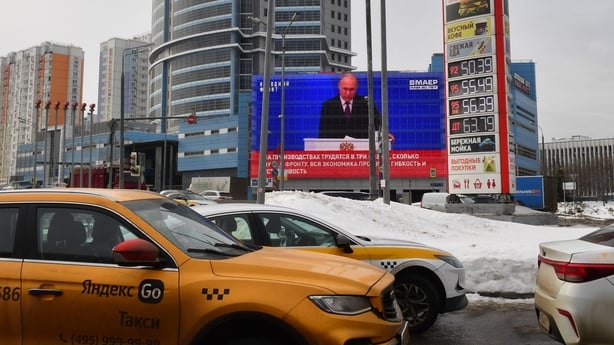Russian President Vladimir Putin has warned Western countries that there is a genuine risk of nuclear war if they sent their own troops to fight in Ukraine, and he said Moscow had the weapons to strike targets in the West.
Addressing parliament and other members of the country's elite, the 71-year-old repeated his accusation that the West is bent on weakening Russia, and he suggested Western leaders did not understand how dangerous their meddling could be in what he cast as Russia's own internal affairs.
He prefaced his warning with a specific reference to an idea, floated by French President Emmanuel Macron on Monday, of European NATO members sending ground troops to Ukraine - a suggestion that was quickly rejected by the United States, Germany, Britain and others.
"[Western nations] must realise that we also have weapons that can hit targets on their territory," said Mr Putin.
"All this really threatens a conflict with the use of nuclear weapons and the destruction of civilisation. Don't they get that?"
Mr Putin, who was speaking ahead of a 15-17 March presidential election when he is certain to be re-elected for another six-year term, lauded what he said was Russia's vastly modernised nuclear arsenal, the largest in the world.

without any real opposition candidates to Vladimir Putin
Putin ramps up war rhetoric in message to West
The war in Ukraine has triggered the worst crisis in Moscow's relations with the West since the 1962 Cuban Missile Crisis and Mr Putin has previously warned of the dangers of a direct confrontation between NATO and Russia.
Visibly angry, Mr Putin, Russia's paramount leader for more than two decades, suggested Western politicians recall the fate of those, like Nazi Germany's Adolf Hitler and France's Napoleon Bonaparte who unsuccessfully invaded his country in the past.
"But now the consequences will be far more tragic," said Mr Putin.
"They think it (war) is a cartoon," he said.
Mr Putin also said that anybody who tried to invade Russia would face harsher consequences than in World War II because the country now had weapons that could hit targets on enemy territory.
Two years after he launched his assault on Ukraine, Mr Putin's position has improved.
Last year at this time, Russian troops were reeling from Ukrainian counteroffensives that pushed them back in northeastern and southern Ukraine.
But after a Ukrainian counteroffensive in the summer of 2023 failed to bring similar results, today Kyiv has moved to defensive positions.
The initially strong Western support for Ukraine also appears to be shaking, with a $60 billion (€55 billion) US aid package stalled in Congress.
Outgunning Ukrainian forces on the battlefield, Putin's troops seized the eastern stronghold of Avdiivka and are attempting to build on their advances.
And on the economic front, Russia is faring better than many expected.
Massive investment in military production, as well as high salaries and benefits for soldiers, has largely shielded the economy from the worst consequences of Western sanctions.
There is little doubt on the outcome of the elections, but Mr Putin has been making numerous media appearances since the start of the year, including recently flying a Russian bomber.
He said he would already "set the objectives for at least the next six years" during the speech today.
Elections, separatist, Ukraine
Mr Putin could react to the appeal by pro-Russian separatists in Moldova's breakaway region of Transnistria, who asked Moscow for "protection" yesterday.
He could also address a statement from his French counterpart Emmanuel Macron, who refused to rule out the dispatch of Western forces to Ukraine.
The Russian leader traditionally takes stock of the past year and sets out new strategic directions in front of his country's political and military elite.
For the past few years he has used the event as a platform to criticise what he calls West's "decadence" - anything that deviates from the traditionalist values promoted by the Kremlin.
In 2023, he accused Western countries of using the conflict in Ukraine as a way "to be done with Russia".
He also said Russians who had chosen "the path of betrayal" needed to be brought to justice amid a heightening crackdown on dissent.
Today's speech also comes on the eve of the funeral planned in Moscow for Mr Putin's top opponent Alexei Navalny, who died in prison on 16 February in unclear circumstances.
Mr Putin, who famously never referred to the opposition leader by name, has so far remained silent on Mr Navalny's death that prompted outrage at home and abroad.

